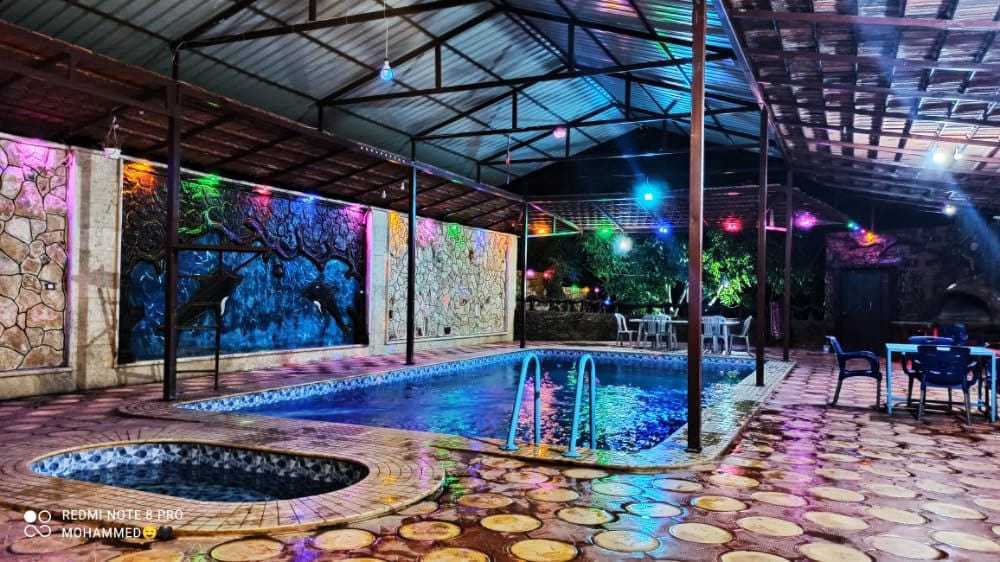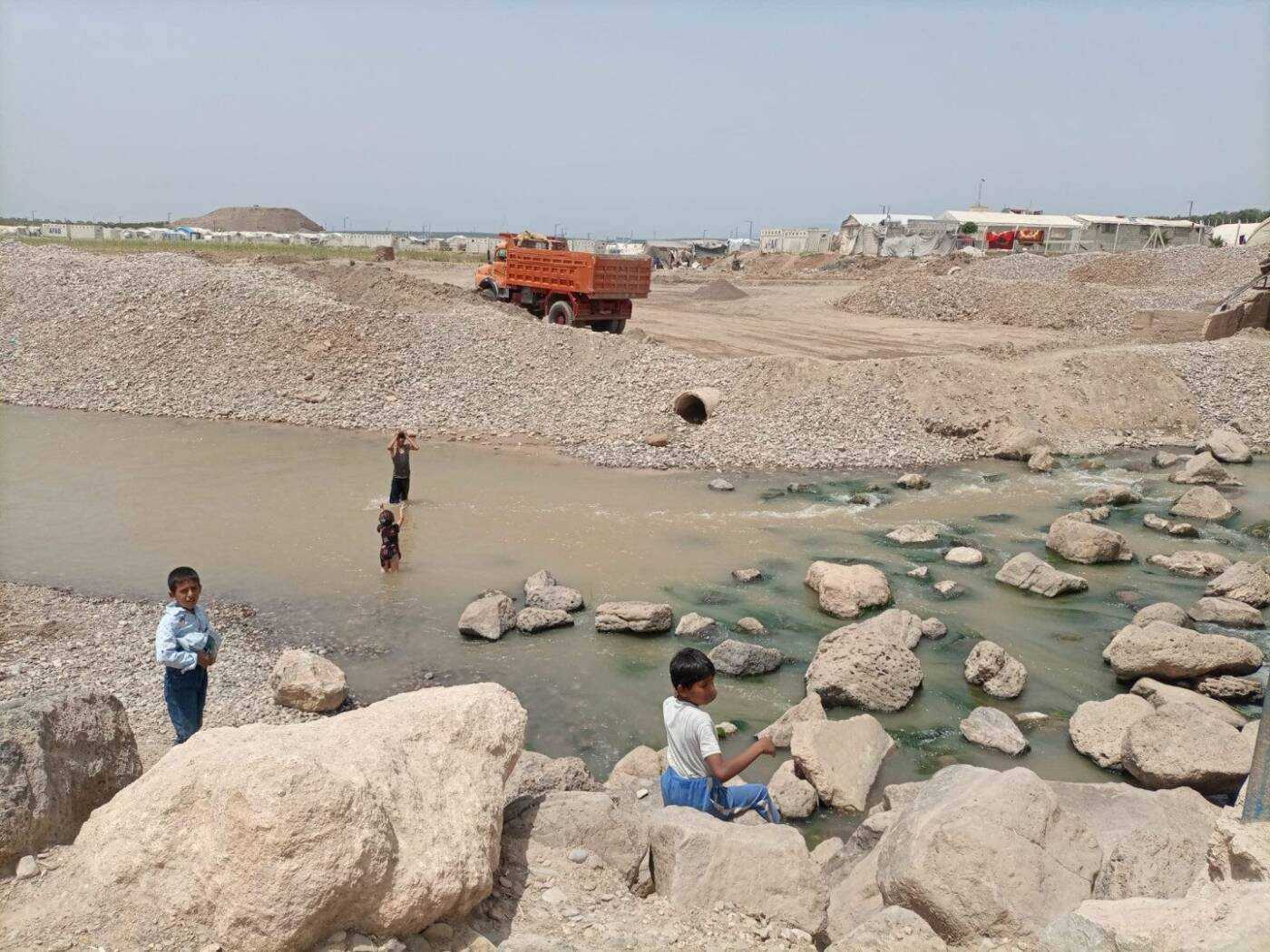Drownings in northwestern Syria: Natural hazards, economic hardship, and lack of accessible recreation
With few free, accessible entertainment options, swimming and recreation in rivers and agricultural ponds leads to drownings in northwestern Syria.
26 May 2022
PARIS — In mid-May, five-year-old Yousef Daqmaq drowned after falling into an irrigation pond he was playing near in the village of Iblin, in the Jabal al-Zawiya area of southern Idlib. Five days earlier, two brothers had died similarly in a pond near the city of Binnish, east of Idlib. Shortly before, on May 2, two young girls drowned in the Qastoun Dam, in northern Hama’s Sahl al-Ghab region, while civil defense personnel were able to rescue a third girl.
Every year, dozens of people drown in Syria’s opposition-held northwest while recreating or swimming in rivers, lakes and agricultural ponds. Public recreation facilities are scarce or prohibitively expensive for many of the region’s four million residents, half of whom are displaced.
Drownings increase in the summer, as “people come together for recreation, or farmers rely on collection ponds to water their crops, especially in the southern Idlib countryside and Sahl al-Ghab,” Muhammad Haj Asaad, the head of the Civil Defense’s First Directorate, told Syria Direct.
From the beginning of 2022 to May 18, civil defense teams responded to 10 distress calls for drownings in northwestern Syria and recovered the bodies of 12 people who lost their lives, Haj Asaad said. Those numbers include five people who fell into wells and six people who were rescued alive and taken to hospitals and medical treatment points. Last year, 54 drownings were recorded in northwestern Syria.
Ignoring warnings
The danger level of bodies of water in northwestern Syria varies according to their “slippery edges, the coldness of the water, steep muddy bottom and varying depths that are not noticeable to civilians while swimming,” Haj Asaad said. “Some have long, tough weeds that impede swimming and movement, leading people to drown and be unable to control the water.” These factors mean the risk of drowning is not limited to people who do not know how to swim.
The main areas where drownings occur, according to Haj Asaad, are the banks of the Orontes and Euphrates rivers, the Maydanki lake, and Ain al-Zarqa. Cases have also been recorded in streams throughout northwestern Syria, as well as artificial agricultural ponds.
The risk of drowning is increased by “people not bringing the necessary swimming equipment that could reduce the possibility of drowning,” the civil defense director said, as well as “riding on boats that are not suitable for use.”
The presence of agricultural ponds in locations “far from residential areas” means children drown “far from the eyes of their relatives,” or older people who could help, said media activist Abdul Razzaq Madi, who lives in Iblin village, where Yousef Daqmaq drowned this month. After Daqmaq fell into the agricultural pond, his family was not aware until “an hour after he’d been gone,” Madi said. Despite the civil defense’s attempts to save his life, the child “passed away before reaching the hospital.”
While children swimming in agricultural ponds seems commonplace in the area, al-Madi stressed the need to “cover these ponds to prevent recurring drownings.”
Agricultural ponds are widespread, especially in the southern Idlib countryside and Sahl al-Ghab. They “pose a great danger to children because they are exposed, at ground level and not fenced in,” Haj Asaad said..
On the whole, northwestern Syria’s bodies of water are “very dangerous and not suitable for swimming,” as evidenced by repeated drownings, he added. Still, residents “flock to them as a place to relax amid the living conditions they are going through.”
Risk reduction
In 2018, along the banks of the Afrin river in the northwestern Aleppo countryside, Turkish NGOs established the al-Muhammadiya camp in April 2018 to receive people displaced from the Damascus suburbs under a settlement agreement between the regime and opposition factions. In the years since, a number of camp residents and others who swim in the river’s waters have drowned, said journalist Fadi Shubbat, who is displaced from south Damascus and lives in the camp.
After repeated drownings in past years, especially in 2020 and 2021, al-Muhammadiya activists and residents appealed to the local civil police in the Turkish-backed opposition area “to ban swimming in the river because of its danger,” Shubbat told Syria Direct.
The police responded by conducting patrols along the river “to prevent swimming,” he said, and “the rate of drownings decreased since last summer.”
In Idlib, civil defense teams organize field visits and are working to install outreach signs in areas where people go to swim, in order to educate and advise civilians of the dangers of swimming in the area’s rivers, lakes and streams. The Civil Defense is also using social media to get the message out to as many people as possible, Haj Asaad said.
Civil defense personnel respond to any report “of a drowning situation and work to rescue or retrieve the bodies from the water,” he said. They also step up their presence “at bodies of water on vacation days and holidays.”
The rescue organization is also working to develop new plans to “educate civilians,” which will launch soon, he said, in addition a campaign to “close old, unused wells and fill in deep pits where rainwater collects, to prevent accidents of falling into them.”
A lack of safe options
Around the al-Muhammadiya camp in Afrin, there are few alternatives for residents who, as summer approaches, seek water activities for entertainment and relaxation. Admission to the local pool for one person is equivalent to a full day’s wage for a worker, while a person could spend all or most or all of one month’s income to rent a vacation home for a day.
“There are no water entertainment places in the camp or the area,” Shubbat said, except for “a small, private swimming pool in Afrin city.” Admission to the pool costs 25 Turkish lira (TRY) ($1.50) per person, while the average daily wage for a worker in northwestern Syria ranges from TRY 30,000-50,000 ($1.80-$3.10).
One alternative recreation option in the area is to rent out a vacation home with a pool for the day, but the cost ranges from $100-$150 per day, which is “a lot for us,” Shubbat said. He and a group of friends have been trying for a month to rent one for a day, “but the cost prevented it.”

A night view of the Muhamma Abu Abdo vacation home in the Darkoush area of the western Idlib countryside (Muhammad Abu Abdo)
Although Shubbat and his friends work for a monthly salary of about $200 each, “for many of us, the priority is to secure basic household needs.”
The lack of affordable options drives some residents to bodies of water that may be dangerous, but are free to access. Meanwhile, “most people don’t think about swimming and entertainment,”he said, and are mainly concerned with “getting by.”
Residents of Afrin and the surrounding area do not have many entertainment options in general. “The majority of the population is displaced people, and their economic conditions are very difficult,” according to Shubbat, meaning that any commercial entertainment projects would not be as popular as in other areas.
In Idlib, there are more private pools and vacation rentals, especially in the west Idlib Darkoush area. But there, too, residents face economic hardship. The decline in the exchange rate of the Turkish lira, the currency in circulation in the region, has also driven up prices.
Muhammad al-Nuseirat was displaced to the north from southern Syria’s Daraa province in 2018 and now works in the mobile phone business in Idlib. He told Syria Direct the admission fee for pools there ranges from TRY 20-30 ($1.20-$1.80), while renting a vacation home for the day costs $150, as multiple people who have rented them told Syria Direct.
Last year, al-Nuseirat rented a vacation home for one day “for TRY 250,” (about $31 according to the exchange rate at the time), but prices rose this year as the Turkish lira’s exchange rate fell. “I can’t rent one this year,” he said.
Zakwan al-Ali, who owns a vacation home in Darkoush, complained about this year’s low turnout, attributing it to “the declining economic situation of most of the area’s residents,” as well as this year’s “volatile weather.” People prefer to go to dams, rivers, and open areas, he said, “since they’re free and cost them nothing.”
Haj Asaad recognized that, with some safe recreation options prohibitively expensive, residents will seek out public places as an alternative. For those who do so, he recommended they “choose the small, shallow rivers in the area,” since they are safer.
This report was originally published in Arabic and translated into English by Mateo Nelson.







